Making Civic Learning Meaningful With And For Young People
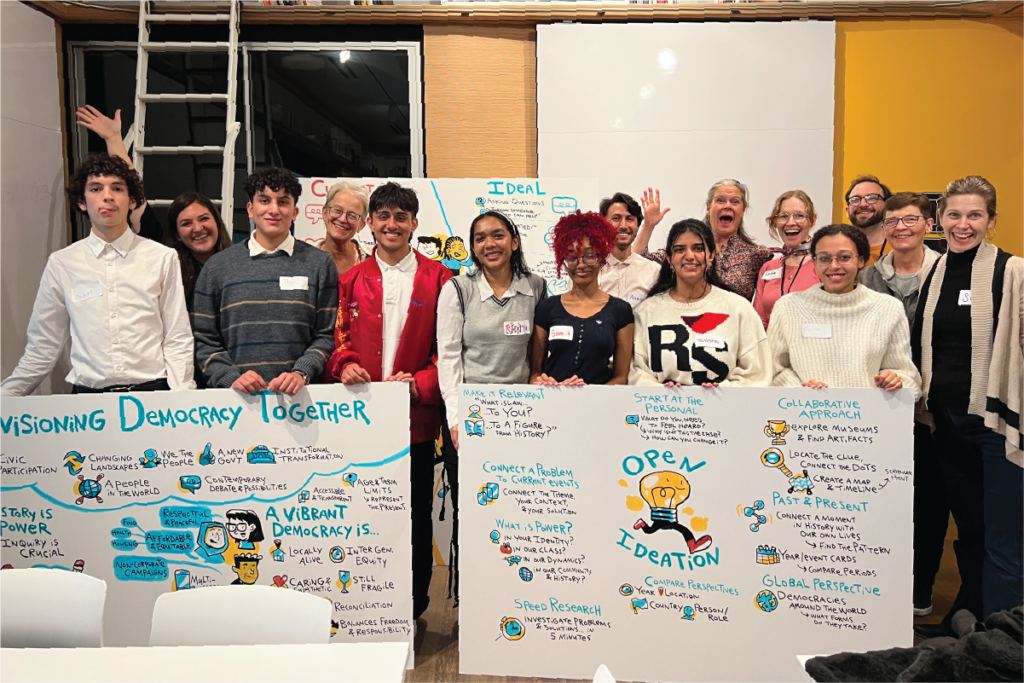
“Promising.”
“Progressive.”
“Unique.”
“Revitalizing.”
“Relief.”
When Moiz, Tanisha, Ibad, Jaiden, and Samirah were asked to describe in one word the workshop they took part in with designers and museum educators from Educating for American Democracy’s civic learning community earlier this month, the students from Thomas A. Edison CTE High School shared these, capturing how resonant and rewarding the co-design experience was for each of them.
Through iThrive’s Game Design Studio, the playful, strength-based participatory design model that steered the afternoon workshop, the teens were engaged as equals and experts as they spent three-and-a-half hours vision-setting, imagining, and ideating alongside others in the civic education ecosystem. For the 17-year-olds, the collaborative space presented an opportunity rare in their worlds—a chance to share how they envision democracy and impact learning that supports the future of it. “[This] really gave me reassurance,” shared Ibad. “There are people working to make our future better using our own opinions.”
Brought together at the New York Historical Society by a project with Educating for American Democracy (EAD), an initiative working to reimagine history and civics education and make it a national priority, the students joined with iThrive Games, History Co:Lab, and Every Museum a Civic Museum, museum educators from Intrepid Museum, the New York Public Library, and the National Museum of American History, curriculum developers from Re-Imagining Migration, and graphic notetaker Aaron Mayper to create a versatile tool that supports the design and development of inquiry-based civic learning experiences.
Pairing the teens with learning-science-backed tools to help them mine their genius and craft playful solutions alongside peers and subject matter experts, iThrive’s Game Design Studio model facilitated the day’s knowledge-building and knowledge-sharing, setting the stage for meaningful co-creation. By the end of the workshop, we had a paper prototype of an interactive card game that animates and amplifies driving questions in EAD’s Roadmap. With the session carried by teens’ curiosity, creativity, and wisdom, the day was a testament to what teen-centered co-design can do and the impactful solutions it brings forth through radical collaboration.
Co-Designing for Meaningful Learning Experiences
Civic learning supports both individual and collective thriving.
Studies conducted by the National Conference on Citizenship and researchers show that civic learning inspires socially responsible civic engagement, increasing a person’s likelihood of voting. Beyond motivating the fulfillment of civic duties, when high-quality civic learning experiences prompt students to think critically about current socio-political events, students are more likely to engage in civil discourse with their peers. Despite this benefit, 92% of teachers are reported to shut down and stop conversations between students when argumentative or contentious.
There is a clear need for high-quality civic learning curricula that effectively supports inquiry and triggers curiosity in young people while accounting for what they and those who educate them experience. Only through radical collaboration and intentional partnership can we hit all the marks. The learning-science-backed Game Design Studio model brings both into shared spaces. Its use earlier this month at a synergetic workshop with HS students to create an interactive learning experience design tool reveals what the inventive and playful co-design method can do for civic education.
The Design Challenge: Building the Deck
When teen and adult participants gathered at the New York Historical Society to co-create with each other, the goal of the session was clear—develop a resource that helps educators in all public spaces devise and design civic learning experiences that stimulate discussion, debate, reflection, and critical thought about American democracy. The resource needed to align with EAD’s Framework and support the imaginations of educators and learning experience designers while being user-friendly and versatile enough for use across all grade levels.
Drawing inspiration from XQ Institute’s competency cards, everyone in attendance knew early on that whatever we created together would, by design, support a rethinking of educational experiences. In this case, that meant enlivening civics and history in a communally defined and teen-centered way.
The Co-Design Experience
The Game Design Studio (GDS) model was devised by social psychologists, accessibility experts, and learning scientists to create a supportive context for discovery where teens feel safe, seen, and heard, and where they connect about issues important and relevant to them (not just what adults think is important).
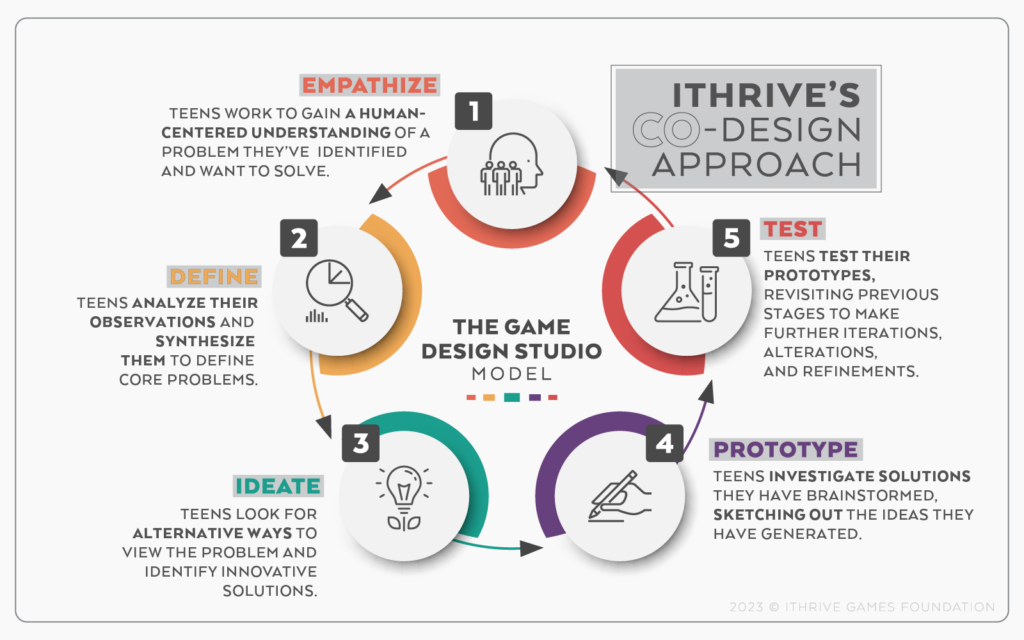
True to the model, the session at the New York Historical Society started with the students learning more about the day’s opportunity to influence civic learning for democracy. After they were given an overview of the goals and intended impact of the Educating for American Democracy’s Roadmap, adult participants began to trickle in and when everyone was in attendance, the workshop kicked off with play. Educators, teachers, and designers played Our Threads, a connection-building question card game iThrive developed with Fugees Family, Inc., to warm up to each other and after playing a few rounds and reflecting on what a card game can do, joined forces to create a vision for the day. While naming these goals, the workshop’s participants also talked through their definitions of a democracy that is inclusive of and healthy for everyone. These high dreams anchored us and our work together as the co-design session progressed.
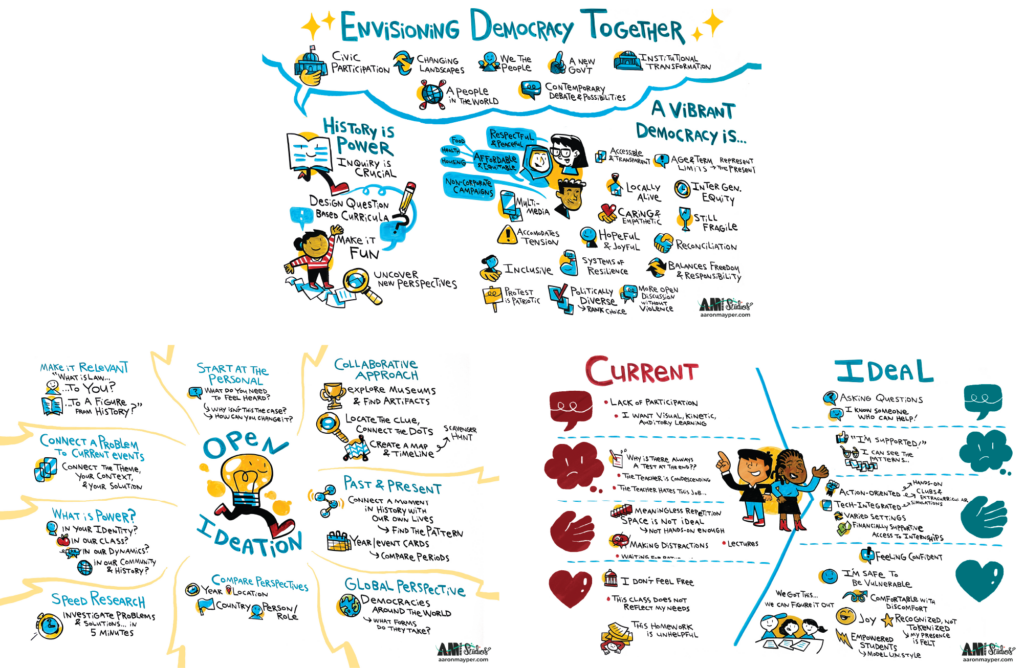
The icebreaker conversations and play were followed by empathy mapping exercises, where teens and educators reflected and shared their lived experiences as students and teachers. Deepening everyone’s understanding of what the other feels, thinks, and does helped the group define success criteria together and clarify all that our learning experience design tool needed to address in order to be effective.
Then came the brainstorming.
Working collaboratively in small groups, students and educators began ideating ways to reflect the experiences and needs of students and teachers in an interactive card game that pulled from themes and design challenges in EAD’s roadmap. Small groups shared their ideas with the larger group for feedback in support of fine-tuning.
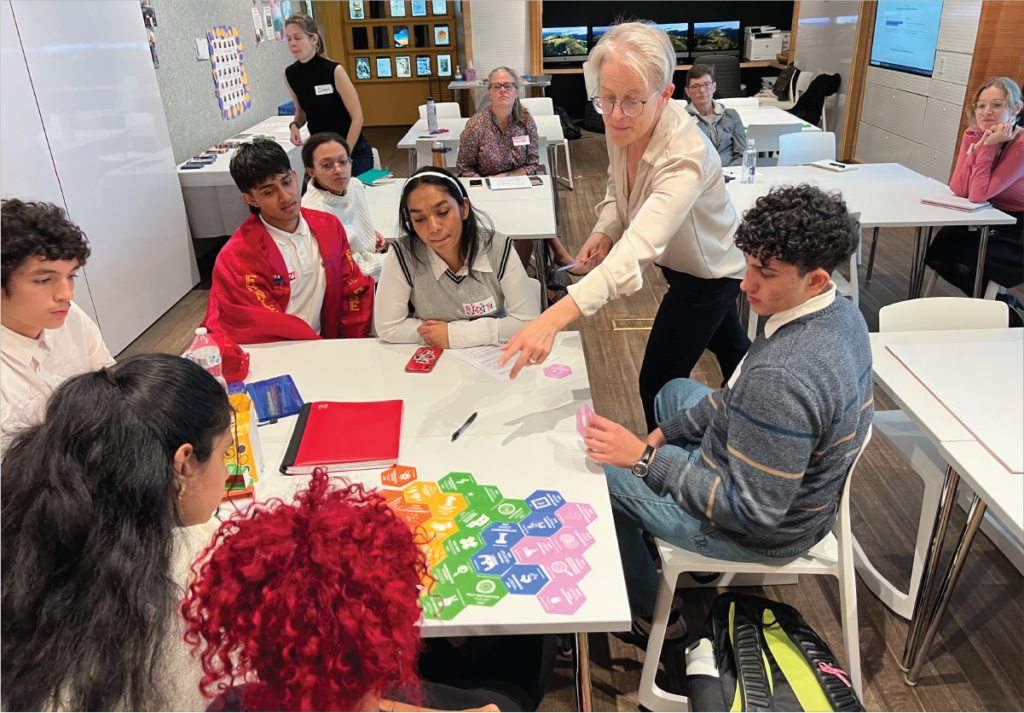
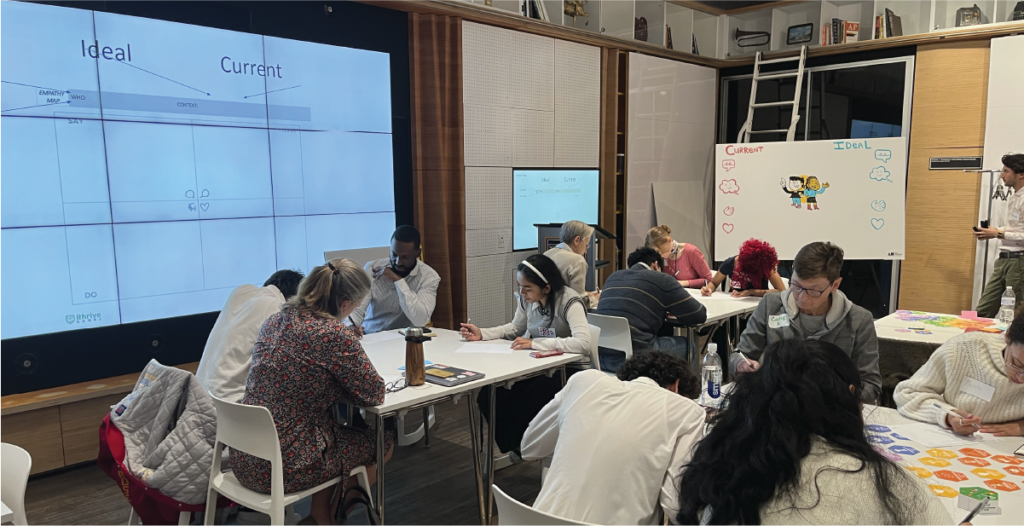
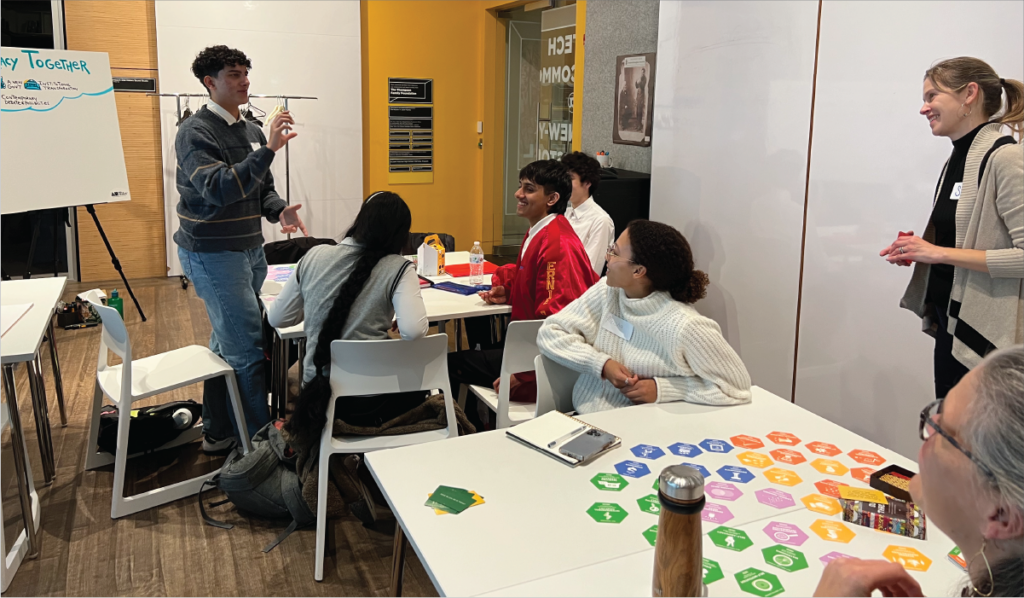
Teens join with teachers, learning experience designers, and museum educators to co-design. As part of the collaborative experience, teens explore the XQ Institute’s competency cards.
Ideas came to life when groups created prototypes that were tested and refined. Toward the end of the workshop, teens pitched to the larger group on the creative solutions they devised with others. An early prototype of the interactive card game to come developed with the support of graphic notetaker Aaron Mayper, seeks to help educators create civic learning experiences for teens that prompt them to ask difficult questions and answer them through analysis and discussion. The first iteration of the game asks users to pick a card from a deck of ‘big’ questions from the EAD roadmap, like “What is power?” and “What is a social contract?” and pair it with contextual factors like year, racial identity, gender, and location from another deck that modify how the question is answered. Teen co-designers also suggested adding ‘to me’ wild cards to the game’s deck to encourage learners to reflect deeply on their own identities and values.
The co-design experience was an impactful one that encouraged teens to define meaningful civic education and invited their influence over how its envisioned by educators. From their hands-on role comes a tool that inspires civic learning experiences in public spaces everywhere that are relevant to them, reflective of their hopes for democracy, and responsive to their educational needs.
The Power Of ‘Co’ Gets Us to Impact
“My voice as a student was heard,” shared Moiz. “My opinion was valued.”
“I realized that as a young person my voice does align with those older than me,” echoed Tanisha.
“This workshop has changed the way I think about democracy. I have learned that my voice matters and makes a difference. Even if I cannot vote, I can still make an impact by sharing my perspective in this space.”
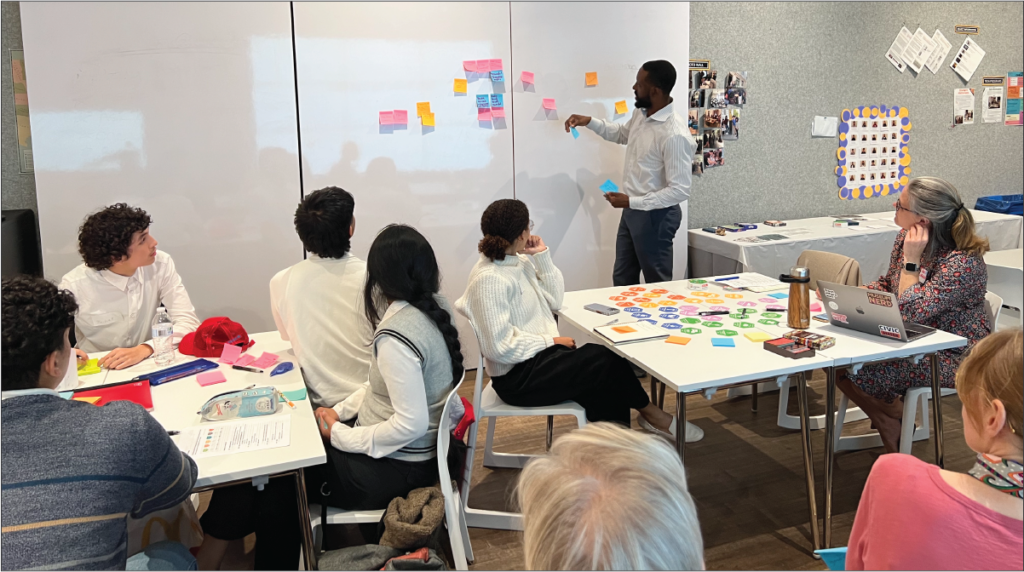
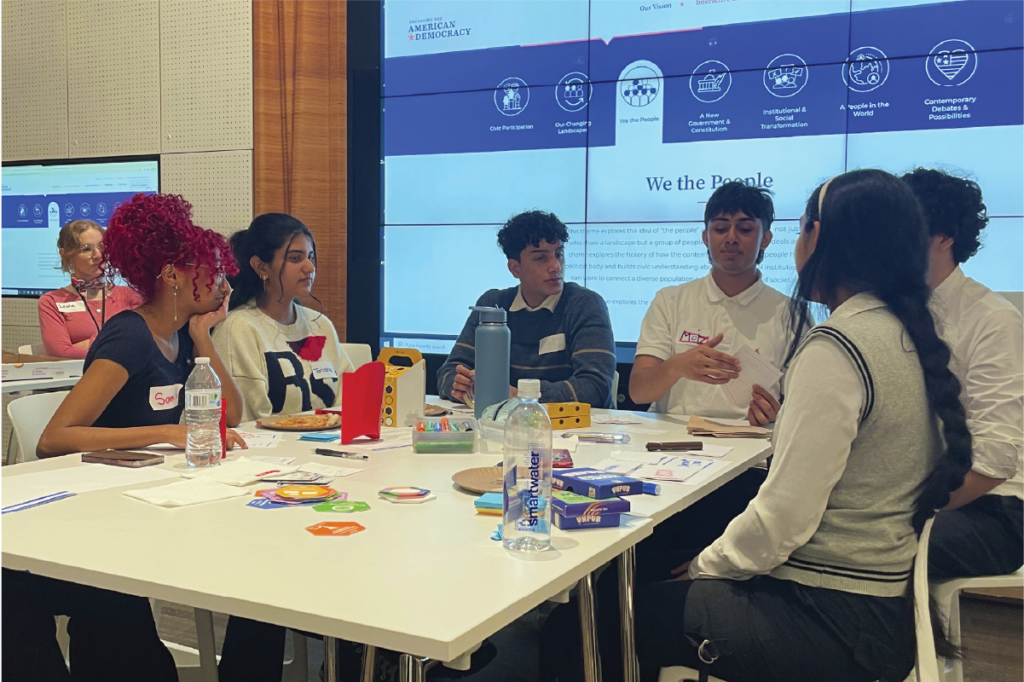
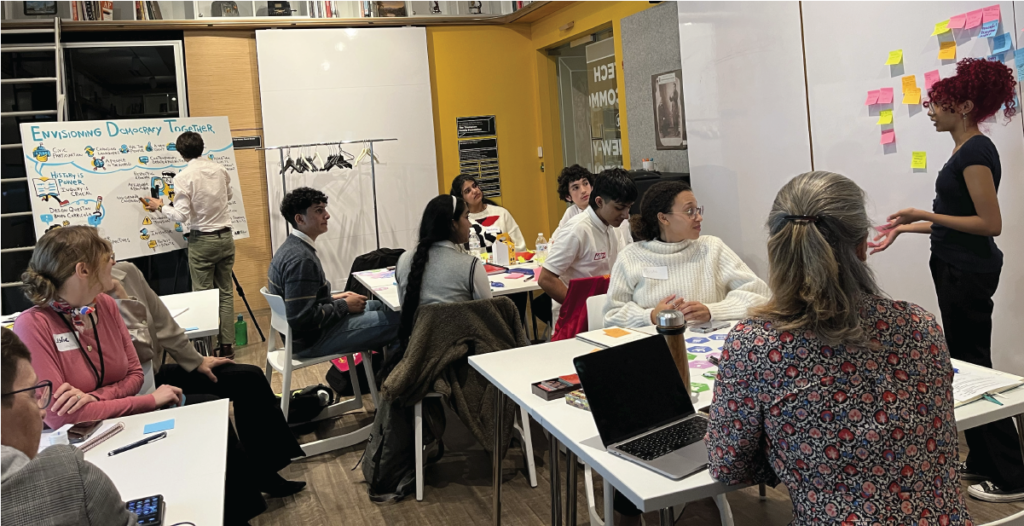
For the high school students who took part in this co-designing workshop, as well as the adult participants, the Game Design Studio (GDS) model that anchored the day helped create an all-embracing experience. By designing civic learning experiences in this collaborative way with teens, we integrate their vision for the world they will one day inherit in the planning of them with a method of cooperation that affirms and empowers them.
“Today’s youth are tomorrow’s future,” shares iThrive’s Executive Director, Susan E. Rivers. “When the Game Design Studio model is brought to the civic learning space to support the co-design of compelling learning experiences, it disrupts a limiting view of young people as just learners by engaging them from the start as thought partners too.”
The co-creative space both teens and adults helped establish that Wednesday afternoon attests to how radical, intentional, and inclusive collaboration can inspire new ways of thinking, doing, and being.The output of the joint experience—an interactive card game and learning experience design tool—are the creative and impactful solutions that come from thoughtfully merging teen genius with subject matter experts. The teen co-designers’ reflections show the GDS model’s impact on the personal level and its unique ability to deeply engage teens in building better systems of learning.
“The only way to design a new system is not just to “involve” young people in the process: we have to engage in intergenerational co-creation,” shares Fernande Raine, CEO and Founder of The History Co:Lab. “Many organizations create token roles for youth that are little more than fig leaves on blatantly adult-centric systems. We want to create spaces for the genius of the teen brain to help imagine and steer us towards the future that this world needs.”
Our co-design model and approach honors the strengths of teens who are uniquely wired to learn by fully engaging them in their genius, and with it we are accelerating progress toward a world where young people are heard, healthy, and co-creators of systems supportive of their thriving.
This post was originally published at ithrivegames.org


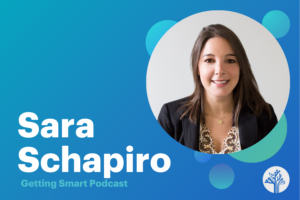
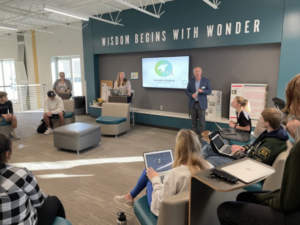
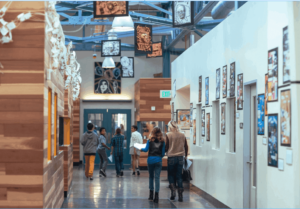
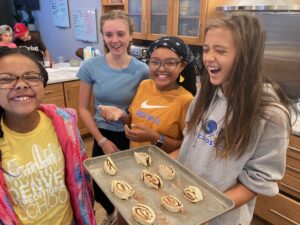
0 Comments
Leave a Comment
Your email address will not be published. All fields are required.